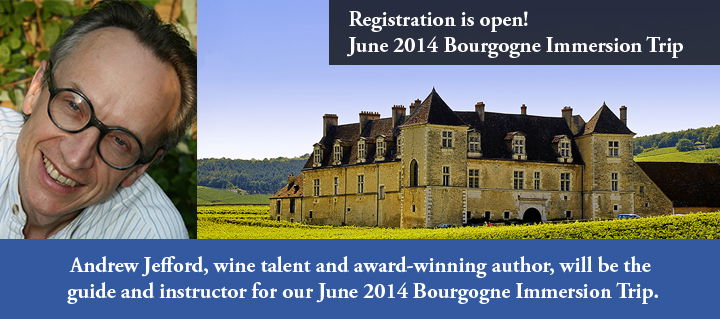BLOG
Andrew Jefford on Burgundy
Julien Camus Latest News
Is Burgundy justifiably complex? (Are there really noticeable differences meriting 101 different AOCs in Burgundy?)
Yes and those differences are real. The names of all the climats often go far back in history, to those monastic records which survived from the Middle Ages. They signify a pattern of difference that was observed during the forty or fifty harvests experienced during the lifespan of each generation. Those differences were in turn repeated and noted as the centuries unfolded. In the 1930s, when the appellation system got underway, that a body of existing practical knowledge acquired legal status via delimitation and regulation.
Both Pinot Noir and Chardonnay here are capable of expressing differences derived from environmental factors -- soils, topography and climate -- to quite an extraordinary degree.
BUT, of course you will still come across near-identical wines under a range of different vineyard designations in the ranges of second-tier négociants; you will come across Grand Cru wines from one grower which are inferior to the village wines of another grower; and you will come across dull or actively unpleasant wines from 'great vineyards'. Many people are involved in producing small quantities of Burgundy from hugely morsellated vineyards, and they aren't all very good at it. Individual failures may not honour the potential of the place, but they don't invalidate it. Burgundy's AOC system constitutes a set of ideals which are hard to live up to. The conditions in this place are very special.
What is important in the study of Burgundy...what concepts do most students find difficult to understand? What do they need to master for things to start to "click"?
Understanding the 'burgundy pyramid' (regional wines, village wines, Premiers Crus and Grands Crus) is relatively straightforward, but the sheer mass of names you will come across is a big hurdle, and the use of lieux-dits on labels adds to that confusion. Personally I set a lot of store by understanding the nature of each village, and the role each village occupies and plays on the Cote d'Or as a whole, and of course the very best way to do this is by travelling up and down the Cote, taking a look at the places where each village sits and how its slopes and sites work, and then tasting a few of its wines. The only other way to come to understand burgundy intimately without travelling to the region is by tasting and drinking a lot of it, with maps and books to hand. Of course we can talk a lot about harvest date, length of maceration and choice of oak barrels, but in a way these things are a distraction from what really matters, which is the vineyards themselves. Once you begin to grasp their personalities, Burgundy will click.
What can you learn from visiting Burgundy?
This trip really will open up the whole region -- from Chablis itself (which arguably isn't in Burgundy at all), right down to the Mâconnais (classic white burgundy in its most accessible and most uncomplicatedly ripe guise). We'll take a look at the Chalonnaise, always a happy hunting ground for classic burgundy flavours at a keen price. And we'll also be looking at some of the top growers and greatest négociants in the Cote d'Or title holders to some of the finest vineyard holdings via in their own domains. And we are planning at least two vineyard walks so our students can take a look at the soil which yields legendary wines like Romanée-Conti and Montrachet. As we drive up and down, I'll be doing my best to point out as much of interest as possible.
There's one other thing to say here, and it is very, very important. Burgundy (especially red burgundy) hates being bottled. In an ideal world, all burgundy would be drunk straight from the barrel. Obviously if you want to drink burgundy in New York, Houston or Chicago, you can't do that; bottling is an unfortunate necessity. Our trip, though, will give students a chance to try some barrel samples. That's truly worth doing.
What fascinates you most about the region and its wines?
I guess in my heart I feel that Burgundy is the great reference for every vineyard region everywhere: the perfect model for the complex and beautiful declension of terroir. So whenever I go to Burgundy, I feel I am going back to the source of everything... like re-reading Tolstoy or Shakespeare, or listening again to the greatest works of Bach, Beethoven or Schubert, or walking into Chartres Cathedral or St Peter's in Rome. A trip to Burgundy is always in some sense a pilgrimage. I don't actually feel that about any other region anywhere in the world.
Of course, as everyone always says, and always says with perfect exactitude, Burgundy is also immensely frustrating: so many bad bottles! And make no mistake, we will come across disappointing bottles in our tastings. I now accept that it probably has to be that way, given the gross hazards of its climate and the fact that it is produced by so many hands from so many tiny patches of vineyard. In a way, I find frustration a source of fascination nowadays, too. You can be pleasantly surprised, as well as horribly shocked. The best bottle of red burgundy I have drunk this year was a village wine, for example. OK, it was Vosne (the 2001 from the old Engel domain), but there you are: not a bank-breaking bottle and it was the loveliness of red burgundy personified. I'm sure every one of our students will have one or two moments like that during the week: tastes, flavours, experiences, insights that they will remember for the rest of their lives, and which will seal their bond with burgundy.
Andrew Jefford, wine talent and award-winning author, will be the exlusive guide and instructor for our June 2014 Bourgogne Immersion Trip. Registration is open. Learn more.


